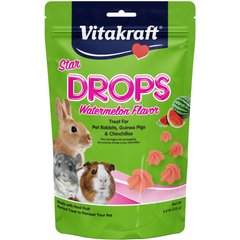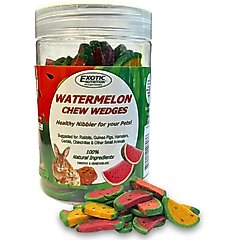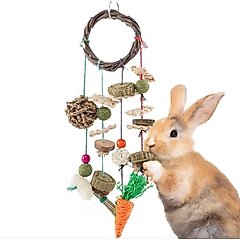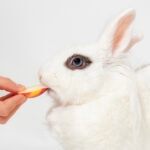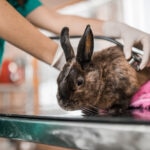Can Rabbits Eat Watermelon?

Photo by zhaojiankang/iStock/Getty Images Plus
Watermelon makes for a sweet, refreshing snack any time of the year—but especially on a hot summer day. Considering our beloved bunnies are herbivores, it’s only natural to wonder, “Can rabbits eat watermelon too?”
The short answer is yes! But like any other delicious treat, moderation is key.
While watermelon is deemed to be a healthy food, fruits are treats that are meant to supplement a rabbit’s diet. A well-balanced diet is essential for a healthy and happy rabbit.
Before introducing any new food into your rabbit’s diet, always check with your veterinarian.
Can Rabbits Have Watermelon?
Yes, rabbits can eat watermelon in small amounts and in moderation.
Fresh watermelon that has been washed and had the seeds removed is the safest for rabbits to eat.
Avoid dried or frozen watermelon. Dried watermelon contains high amounts of sugar, and frozen watermelon can be too cold for rabbits to eat.
You can also treat your pet rabbit to store-bought treats that feature watermelon, such as:
Recommended Products
Is Watermelon Good for Rabbits?
Watermelon does have some health benefits for rabbits, including:
- High water content: Watermelon is 92% water, making it a tasty, hydrating snack when temperatures rise.
- Loads of vitamin C: Even though rabbits can synthesize their own vitamin C, research has found that dietary supplementations of vitamin C can be beneficial to their overall health.
- Low in calories: When your bunny eats watermelon every once in a while, you won’t have to worry about it causing unwanted weight gain, as a single cup of diced watermelon has only about 45 calories, according to the United States Department of Agriculture (USDA).
- Packed with vitamins, minerals, and antioxidants: Watermelon contains a considerable amount of vitamin A, vitamin B6, potassium, and lycopene, all of which can be beneficial to the immune system.
Is Watermelon Bad for Rabbits?
Despite being a healthy food, watermelon can lead to certain health concerns if eaten in large amounts or too frequently.
Potential risks to be mindful of before feeding watermelon include:
- High sugar content: The high sugar content in watermelon can disrupt a rabbit’s gastrointestinal (GI) tract and microbiome. Additionally, ingesting too much watermelon or fruit daily can lead to obesity, says Christine Austin, DVM, shelter veterinarian at House Rabbit Society, in Richmond, California.
- Too much water: Watermelon is water-rich (as opposed to fiber-rich) and isn’t a part of a rabbit’s regular diet, which could result in digestive upset.
- Choking hazard: Black watermelon seeds are choking hazards and may cause digestive blockages in rabbits. Opt for seedless watermelon—but still double-check for signs of the occasional seed before feeding.
- Too soft: Rabbits’ teeth continuously grow throughout their lives, meaning they need to constantly wear them down with hay and chew toys, like SunGrow chew toys. Watermelon flesh is fairly soft and isn’t beneficial to their dental care.
- Selective eating: “Rabbits will often pick sugary fruits over healthier options when given the choice,” Dr. Austin says.
Recommended Product
How Much Watermelon Can I Give My Rabbit?
Fruits are considered treats to rabbits and should be fed in moderation, making up no more than 2% of your rabbit’s daily diet. The rest should come from a well-balanced diet of hay and grass (about 80%) and fresh vegetables (10–15%), with the rest of their diet consisting of pellets and fruits.
An appropriate serving size of watermelon for an adult rabbit of a healthy weight is no more than 1–2 tablespoons, Dr. Austin says.
It’s generally recommended to feed up to 2 ounces of any type of treat per day. For fruits and root vegetables, this amount equates to the size of a baby carrot.
Because watermelon is very high in sugar, it should be fed in moderation and not daily, Dr. Austin says.
How To Safely Feed Watermelon to Rabbits
Thinking of treating your rabbit to this nutritious and oh-so-delicious fruit? Here’s how to feed it safely:
- Make sure the watermelon is ripe. It should be firm and heavy and have a yellow spot. It shouldn’t have any dents or bruises.
- Wash the entire watermelon. Thoroughly wash the entire watermelon to remove dirt and pesticides. Pat the watermelon dry after rinsing.
- De-seed the watermelon. With a clean knife, carefully remove the seeds upon cutting your watermelon.
- Cut the watermelon into bite-size pieces. “Bite-size” will depend on the size of your rabbit, but small pieces are ideal to limit portions and minimize the choking risk.
- Serve fresh on its own or in a rabbit-friendly salad. You can offer watermelon by hand or mix it with other fruits and vegetables that are safe for rabbits—such as tomatoes, blackberries, and celery—to make a salad.
Always introduce new foods slowly and monitor for any signs that indicate your rabbit might not tolerate a food.
My Rabbit Ate Too Much Watermelon—What Do I Do?
Fruits are naturally high in sugar. Some rabbits might be able to eat watermelon without any issues, while others might have more sensitive stomachs.
According to Dr. Austin, eating large amounts of watermelon at one time can lead to:
- Soft poop or diarrhea
- GI upset (which can look like decreased appetite)
- Cecal dysbiosis (an imbalance in your rabbit’s gut flora)
“If pet parents notice any of these signs, they should take their rabbit to a rabbit-savvy vet right away,” Dr. Austin says. “Rabbits have sensitive GI systems and hide many signs of illness. So, if any symptoms are noticed, it can become an emergency fairly quickly.”
Dr. Austin explains that vet care for overconsumption of watermelon will consist of:
- Supportive care to make sure your rabbit is hydrated if they’re losing liquid through diarrhea
- Pain medication if your rabbit’s GI tract is causing them pain
- A proper diet high in fiber to restore the GI tract and its microbiome to its normal function
What Other Fruits Can Rabbits Eat?
Some human foods—mainly fruits and vegetables—are safe for rabbits to eat occasionally. It’s always best to feed any rabbit-friendly fruit occasionally as a treat and not as a main part of your bun’s diet.
Some fruits that are safe for rabbits to eat include:
- Apples (no seeds)
- Bananas
- Berries (strawberries, blackberries, blueberries, raspberries)
- Cherries (no seeds)
- Grapes
- Mangos
- Melons
- Oranges
- Peaches (no pit)
- Pineapples
- Plums (no pit)
- Tomatoes
FAQs About Watermelon for Rabbits
Q: Can baby rabbits eat watermelon?
A: Technically, yes, because watermelon isn’t toxic to baby rabbits. However, it’s not recommended to feed watermelon—or treats in general—due to the naturally high amount of sugar, which can cause GI upset and diarrhea.
You can start giving treats when your rabbit reaches 5–7 months old, depending on your individual rabbit’s rate of development.
Q: Can rabbits eat watermelon seeds?
A: No, rabbits should not eat watermelon seeds because they’re a choking hazard.
Q: Can rabbits eat watermelon rind?
A: Yes, rabbits can eat watermelon rind. However, although the crunchy texture can be appealing for rabbits to chew on, Dr. Austin says the rind offers little to no nutritional value and should be fed in moderation, if at all.
Q: What fruits are toxic to rabbits?
A: Avocados and seeds from most fruits are toxic to rabbits and shouldn’t be fed, Dr. Austin says.
